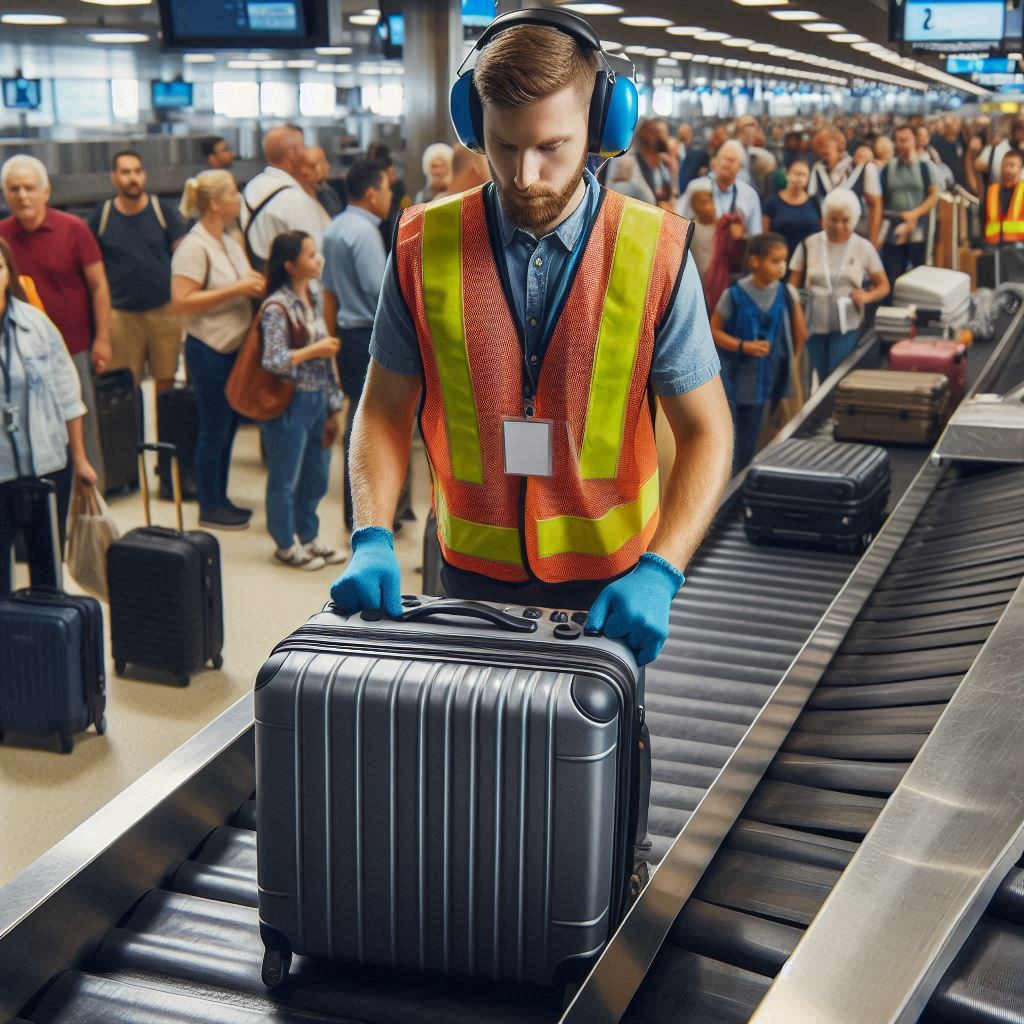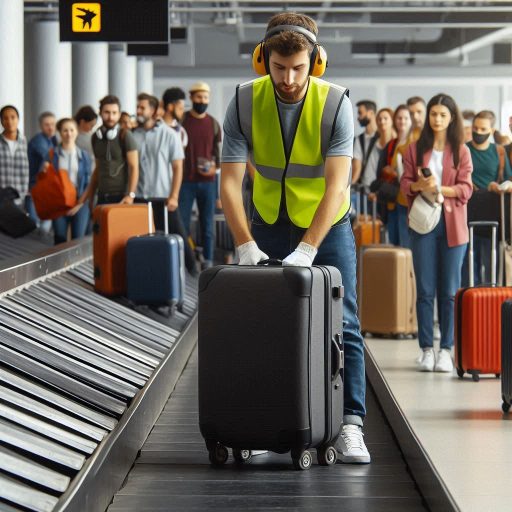Introduction
Unions play a vital role in protecting workers’ rights across various industries.
They negotiate better wages, benefits, and working conditions.
Union membership gives employees a collective voice, allowing them to advocate for fair treatment.
In industries like manufacturing, healthcare, and transportation, unions have helped workers achieve improved safety standards and job security.
These benefits highlight why unions remain significant in shaping labor policies.
Baggage handlers, who play a crucial role in the airline industry, often face challenging working conditions.
They work in fast-paced environments, handling heavy loads and dealing with unpredictable schedules.
These factors make the conversation about union membership for baggage handlers particularly relevant.
Union representation could offer them the same protections seen in other unionized industries.
Through union membership, baggage handlers could gain a stronger platform to negotiate better pay, safer working environments, and more predictable hours.
With increasing demands on airport staff, their need for greater support is clear.
Many workers in this role already express concerns about job security and fair treatment.
The possibility of union membership presents an opportunity for baggage handlers to advocate for their rights.
Addressing these concerns could lead to a more stable, safer work environment.
Pros of Union Membership for Baggage Handlers
Job Security: Protection from Unjust Dismissal or Mistreatment by Employers
Union membership provides baggage handlers with increased job security.
Unions negotiate contracts that protect workers from unjust dismissal.
This means that employers must have valid reasons to terminate employment.
Without union representation, workers might face dismissal for arbitrary or unfair reasons.
When employers must follow strict procedures, employees feel more secure in their jobs.
Union contracts ensure that any disciplinary actions are transparent and fair.
In cases of disputes, unions provide legal support and representation for their members.
This reduces the likelihood of mistreatment or exploitation by employers.
Improved Pay and Benefits: Negotiation Power for Better Wages and Benefits
Unionized baggage handlers typically enjoy better pay and benefits than their non-unionized counterparts.
Unions use collective bargaining to negotiate higher wages.
This results in more competitive pay rates and better compensation packages.
With union support, employees can demand fair treatment in wage negotiations.
In addition to better wages, unions often secure enhanced benefits for their members.
These benefits can include health insurance, retirement plans, and paid time off.
Having a union increases workers’ bargaining power, leading to improvements in overall compensation.
Unions also negotiate for regular wage increases, ensuring that pay keeps up with inflation.
As a result, baggage handlers in unions often experience long-term financial stability.
This financial security provides a safety net, improving the quality of life for workers and their families.
Health and Safety Regulations: Advocacy for Safer Working Conditions
Unions play a crucial role in advocating for the health and safety of baggage handlers.
They actively push for better working conditions and enforce compliance with safety regulations.
Baggage handling is physically demanding, often leading to injuries without proper precautions in place.
Unions work to reduce workplace hazards by negotiating for stricter safety measures.
Union representatives regularly inspect work environments to ensure that safety standards are met.
They also advocate for better equipment and training to reduce the risk of injury.
With a union, workers are more likely to have access to personal protective equipment and ergonomic tools.
This proactive approach helps to minimize accidents and improve workplace safety.
Unions can also provide support to workers who are injured on the job.
They assist in filing claims and ensure that workers receive appropriate compensation.
By advocating for safer conditions, unions help to protect the long-term health and well-being of baggage handlers.
Union membership offers baggage handlers numerous benefits, including job security, better pay, and safer working conditions.
Through collective bargaining, unions enhance the quality of life for their members, ensuring fair treatment and protection in the workplace.
Read: Nail Technician Networking: Building Industry Connections
Cons of Union Membership for Baggage Handlers
Union Fees: Financial Burden of Membership Dues
One of the downsides of union membership for baggage handlers is the requirement to pay union fees.
These fees, or dues, fund union operations, such as negotiations and legal support.
However, paying dues can be a financial burden, especially for those earning lower wages.
Baggage handlers must contribute a portion of their earnings to the union on a regular basis.
While the dues fund vital services, they can reduce take-home pay for workers.
Some employees may question whether the benefits of union membership outweigh this cost.
This is particularly true when wages are already tight.
In addition, union dues are typically non-negotiable.
Whether or not a member benefits directly from recent negotiations, all members pay the same fees.
Over time, this ongoing financial obligation can be challenging for workers, especially in industries with lower income levels.
Lack of Individual Negotiation Power: Limited Flexibility
When workers join a union, they often sacrifice individual negotiation power.
Union agreements typically apply to all members, regardless of individual circumstances.
This lack of flexibility may frustrate workers who prefer to negotiate directly with their employer.
For instance, some baggage handlers might want to negotiate for a higher wage based on performance.
However, union contracts can limit such flexibility by standardizing pay rates across the board.
Union contracts also govern working conditions, leaving little room for individual customization.
Workers must accept the terms negotiated by the union, even if they would prefer different arrangements.
This can result in dissatisfaction for employees who feel they could achieve better results on their own.
The standardized nature of union agreements can stifle opportunities for personalized rewards or benefits.
Additionally, workers may find it difficult to negotiate their own promotions or bonuses outside of union rules.
This loss of individual control over their careers can be a significant drawback for some baggage handlers.
Potential for Strikes or Conflicts with Management
Union membership increases the likelihood of strikes or conflicts with management.
Strikes occur when unions and employers cannot reach agreements during contract negotiations.
While strikes are a powerful tool for workers, they can lead to unpaid time off.
This disrupts income for baggage handlers who may already be struggling financially.
Strikes can also create tension between workers and management, leading to long-lasting conflicts.
These conflicts can make it harder for employees to build positive relationships with their supervisors.
In some cases, ongoing disputes between the union and management may lead to a hostile work environment.
Baggage handlers could find themselves caught in the middle of these disputes, affecting their job satisfaction.
Even when strikes are avoided, the mere threat of conflict can disrupt the workplace.
Workers might experience uncertainty or anxiety about future negotiations and their outcomes.
While union membership offers benefits like collective bargaining, it comes with drawbacks, including union fees, limited flexibility, and potential conflicts.
Workers must weigh these factors before deciding if union membership is the right choice for them.
Read: The Role of Technology in Modern Pet Grooming
Case Studies: Successful Unionization for Baggage Handlers
Positive Outcomes from Union Membership in Baggage Handling Companies
Union membership has led to positive outcomes for baggage handlers in several prominent companies.
Airlines like United Airlines and Delta have seen notable improvements in worker satisfaction due to union representation.
For example, baggage handlers at United Airlines, represented by the International Association of Machinists and Aerospace Workers (IAM), have successfully negotiated better pay and working conditions.
Similarly, Delta’s baggage handlers, represented by the International Brotherhood of Teamsters (IBT), have benefitted from strong union agreements.
In these companies, unions have provided a unified voice for baggage handlers, leading to more effective negotiations with management.
Union membership has also led to success at Southwest Airlines, where workers, represented by the Transport Workers Union (TWU), secured improved wages.
These successes illustrate how union membership can yield tangible benefits for baggage handlers in different companies.
Improved Working Conditions for Baggage Handlers
Unions have played a key role in improving working conditions for baggage handlers.
At United Airlines, IAM has negotiated safer working environments for its members.
Union-led initiatives have introduced better equipment and training to reduce the risk of injury.
As a result, baggage handlers have access to tools that protect their physical well-being, such as ergonomic carts and lifting aids.
Unions also ensure that health and safety regulations are strictly enforced.
Regular inspections, driven by union representatives, ensure that hazardous conditions are addressed swiftly.
By advocating for safer workplaces, unions help reduce the number of injuries on the job.
These changes have improved both job satisfaction and safety for baggage handlers.
At Southwest Airlines, TWU helped establish a grievance system that allows workers to report safety issues without fear of retaliation.
This has empowered workers to take an active role in ensuring their workplace remains safe.
Enhanced Pay and Benefits for Unionized Baggage Handlers
Unionized baggage handlers often enjoy better pay than non-union workers.
At Delta, IBT negotiated substantial wage increases for baggage handlers, raising their pay to competitive industry levels.
These higher wages provide greater financial stability for employees and their families.
In addition to improved wages, unions have secured better benefits packages, including comprehensive health insurance and retirement plans.
At United Airlines, union members benefit from paid vacation time, sick leave, and strong retirement plans.
These perks, negotiated by IAM, provide baggage handlers with long-term financial security.
Union agreements often include regular wage increases, ensuring that workers’ pay keeps pace with inflation.
The financial improvements secured by unions help raise the overall quality of life for baggage handlers.
In summary, union membership in baggage handling companies has led to significant improvements in pay, benefits, and working conditions.
Examples from United, Delta, and Southwest illustrate the positive impact unions can have on workers’ lives, offering greater security, safety, and financial stability.
Read: Customer Service Tips for Pet Grooming Professionals

Challenges Faced by Unions in Representing Baggage Handlers
Resistance from Employers: Opposition to Unionization Efforts
Employers often resist unionization efforts, fearing the loss of control over workplace policies.
Many baggage handling companies prefer to manage labor issues internally without external interference.
Employers may argue that unions complicate decision-making and limit flexibility in operations.
In some cases, companies actively discourage union efforts by organizing anti-union campaigns.
These campaigns may include tactics like mandatory meetings or distributing anti-union literature to workers.
Employers may also use legal channels to delay or block union elections.
These tactics aim to prevent unions from gaining a foothold in their operations.
Companies often believe that unionized workplaces may lead to higher labor costs and decreased productivity.
As a result, resistance from employers can create significant challenges for workers trying to unionize.
Negotiation Challenges: Balancing Worker and Management Interests
Negotiating fair contracts between workers and management can be challenging in the baggage handling industry.
Unions strive to secure the best possible terms for workers, including higher pay and improved benefits.
However, management must balance these demands with the company’s financial health and operational needs.
This balancing act often leads to lengthy negotiations that can delay necessary improvements for workers.
Sometimes, workers may feel that unions concede too much during negotiations, leading to dissatisfaction.
On the other hand, management may feel that union demands are unreasonable or unsustainable.
This tug-of-war can result in strained relationships between the union and management, making collaboration difficult.
Negotiation challenges also arise when companies face financial constraints, such as declining profits or increased competition.
In these situations, union representatives must carefully weigh the potential impact of their demands on the company’s future.
Achieving a fair and sustainable agreement requires a delicate balance of interests.
Changing Industry Dynamics: Adapting to Shifts in the Baggage Handling Industry
The baggage handling industry is constantly evolving, and unions must adapt to these changes to remain effective.
Technological advancements, such as automated baggage handling systems, are reshaping the industry.
As companies adopt new technology, the role of baggage handlers is shifting, and unions must advocate for worker protections in this changing landscape.
Unions must also address job security concerns as automation reduces the need for manual labor.
In response, unions often push for retraining programs to help workers transition into new roles.
Keeping up with industry trends allows unions to protect their members in the face of modernization.
However, rapid industry changes can make it difficult for unions to negotiate long-term contracts.
Economic fluctuations also affect the bargaining power of unions.
During periods of economic downturn, airlines may cut costs, putting pressure on unions to accept lower wages.
Adapting to these dynamics requires unions to remain flexible and responsive to industry shifts.
All in all, union membership in the baggage handling industry faces challenges from employer resistance, negotiation hurdles, and changing industry dynamics.
Despite these obstacles, unions continue to play a vital role in protecting workers’ rights and adapting to industry changes.
Read: Nail Technician Etiquette: Dos and Don’ts
Conclusion
Union membership for baggage handlers presents both advantages and disadvantages.
One of the primary benefits is job security.
Unions negotiate better wages and protect workers from unfair dismissals.
Baggage handlers also gain access to improved working conditions and benefits like health insurance and retirement plans.
Collective bargaining gives them a stronger voice in addressing safety concerns, reducing the risk of injuries.
Unions provide legal support in disputes, ensuring workers aren’t alone when facing employer challenges.
However, there are downsides to union membership.
Union dues are mandatory, reducing take-home pay for workers.
Some employees may feel restricted by union decisions, as collective agreements limit individual negotiations.
Additionally, unions can cause tension between workers and management, potentially leading to strikes or labor disruptions that affect both sides.
Despite these cons, unions play a critical role in protecting workers’ rights.
They ensure fair treatment, promoting healthier and safer environments.
Unions empower workers to stand together, which is especially important in demanding jobs like baggage handling.
While there may be challenges, the protection and benefits unions offer outweigh the drawbacks.
For many baggage handlers, union membership remains a key factor in improving workplace conditions and maintaining dignity in their work.
[E-Books for Sale]
The Big Book of 500 High-Paying Jobs in America: Unlock Your Earning Potential
$19.99 • 500 High-Paying Jobs • 330 pages
Explore 500 high-paying jobs in America and learn how to boost your career, earn more, and achieve success!
See All 500 High-Paying Jobs of this E-Book
1001 Professions Without a Degree: High-Paying American Jobs You Can Start Now
$19.99 • 1001 Professions Without a Degree • 174 pages
Discover 1001 high-paying jobs without a degree! Unlock career tips, skills, and success strategies for just $19.99!




